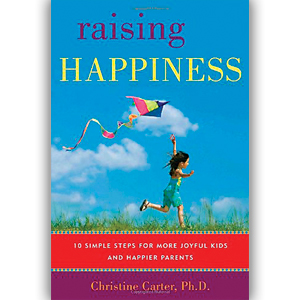
The Heart of Happy: A Review of Raising Happiness
With school starting back up soon, I wanted to read something that would keep me mindful of the difference between my children excelling in school and being happy in school. And the rest of their lives for that matter. So this month I’m blogging on Raising Happiness by Christine Carter. While Carter insists in her book that happy people are typically also successful people, I think it’s easy to lose sight of what it is we want most for our children – happiness. So I was curious to find out more about Carter’s 10 simple steps for making more joyful kids and parents.
Carter begins by defining happiness as “much more than a mood or a cheerful disposition. Rather, a happy life is one that is full of lots of different types of positive emotions.” Then, she explains that “happiness is a skill that we can teach our children.” And who wouldn’t want to teach her child that, especially after Carter establishes how important happiness is in the long run? Did you know happy people tend to be healthier and live longer? Teaching your child how to be happy is like the gift that keeps on giving.
I loved “Put on Your Own Oxygen Mask First” because, as Carter reminds readers, “our own happiness as parents influences our children’s happiness in a variety of ways.” Mainly, a depressed parent isn’t able to offer empathy and play in an “emotionally positive way.” And as Carter points out, “Kids are great perceivers of emotion and tension, but most often they think that they are responsible for their parents’ fighting, or even their parents’ unhappiness.”
Next, Carter argues that happy people have better relationships, as people want to be with them. She claims, “Despite the fact that technology and social media make it easier than ever to be “connected” to lots of people all the time, Americans are becoming less and less connected to one another.” When Carter’s life gets so hectic that she has no time to spend with friends, she thinks about what kind of role model she’s being for her children and schedules some face time with a friend.
I also loved how Carter devoted a section of “Build a Village” to the importance of volunteering. She shares a variety of effective research throughout the book, but in this case, it’s a powerful study of how “people 55 and older who volunteer for two or more organizations had an impressive 44 percent lower likelihood of dying during the study period.” Therefore, doing good for others is really doing good for yourself, thanks to what Carter label’s the “helper’s high.” She uses this physical state to back up why parents shouldn’t reward helping behavior, as it robs kids of the intrinsic motivation that comes from doing good for someone else.
But my favorite part was in the chapter, “Expect Effort and Enjoyment, Not Perfection,” and how choice can be a curse. Carter claims, “Happy people have different decision-making processes than unhappy people; they tend to ‘satisfice’.” This means to choose something based on “present criteria and move on.” It’s the opposite of what she calls “maximizing,” which sadly I do all the time. I’m always analyzing every situation ad nauseam and then agonizing over whether I made the right decision once I finally make one. Reading Carter’s description of my behavior was eye-opening, as the last thing I want to do is perpetuate that kind of perfectionism in my daughters. So I’m thinking of trying out one of her tips – to employ the prompt “One mistake I made today…” at the dinner table so we can all practice coping with our imperfections.
This book does a great job of helping readers set the stage for their children’s happiness by addressing such things as how to form happiness habits and how to rig your environment for happiness. Her suggestion to practice gratitude is just the beginning of the art and science of raising happy kids. Because contrary to what you might want to believe higher income only correlates with higher happiness up to $50,000 a year. After basic needs are met, Carter claims, “Financial resources seem to lose their hold on our happiness and well-being.” So check out Raising Happiness by Christine Carter if you’re looking for a resource to help you instill joy in your family’s life.
Follow @WinterhalterV on Twitter for updates on blog posts or like Parenting by the Book on Facebook.






